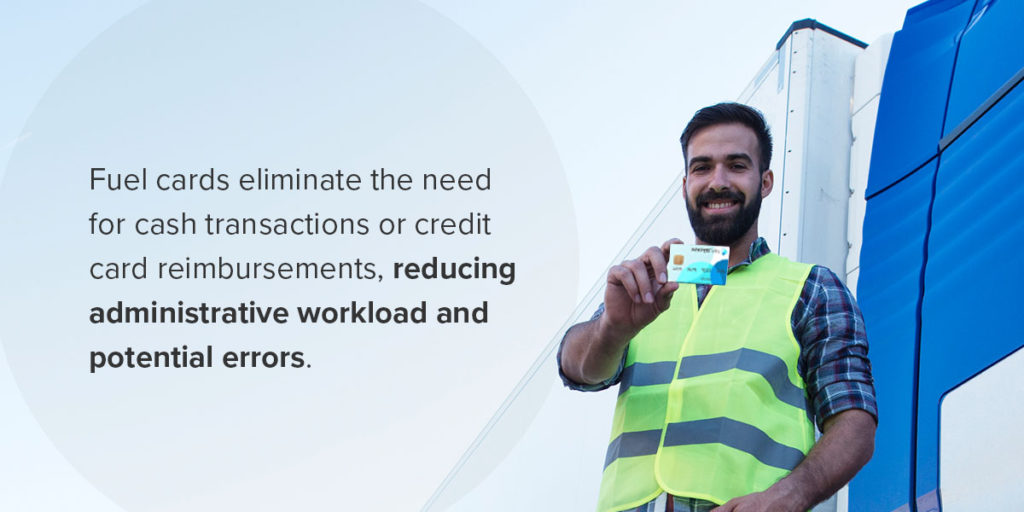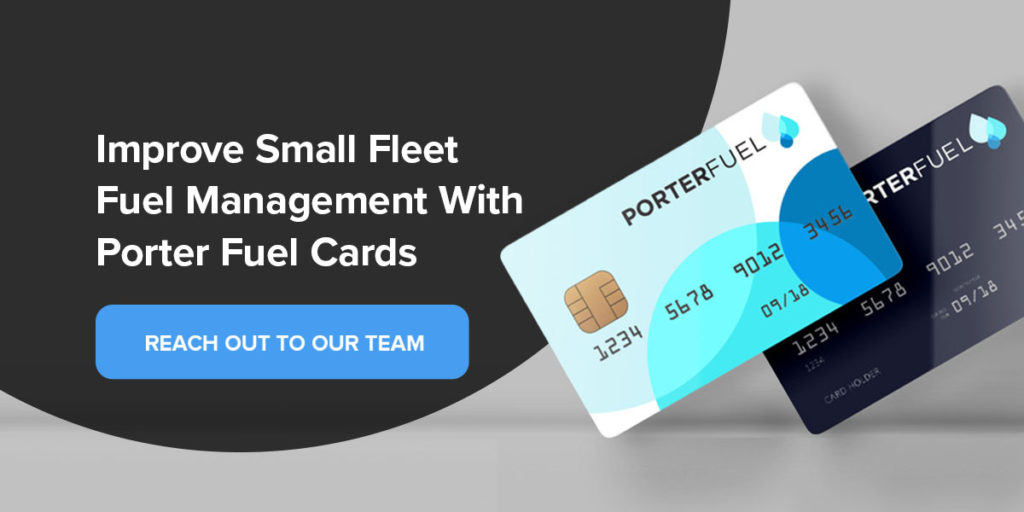Fuel cards integrate seamlessly into fleet management systems, providing real-time data on fuel purchases, automating expense tracking and offering controls that significantly reduce fuel fraud and misuse.
Jump To Section
The Advantages of Fuel Cards for Fleet Management
Implementing fuel cards as part of a comprehensive fleet management strategy offers numerous benefits for small fleets:
Improved Operational Efficiency

Fuel cards streamline the entire fueling process, from purchase to reporting. They eliminate the need for cash transactions or credit card reimbursements, reducing administrative workload and potential errors. This automation saves time and improves accuracy in financial reporting, which is particularly beneficial for small fleets with limited resources.
The reduced administrative burden frees up valuable time for more strategic tasks like business development or customer relationship management. Small fleet operators can focus on growing their business rather than getting bogged down in day-to-day administrative tasks. The streamlined reconciliation process at the end of each billing cycle allows for quicker closure of financial periods and more timely insights into the fleet’s financial performance.
Increased Cost Control
The primary advantage of fuel cards is their ability to reduce overall fuel costs for small fleets. By partnering with stations that consistently offer lower base fuel prices, effective card programs provide access to cost-effective fueling options across a vast network. This strategy enables small fleets to compete more effectively with larger operations by securing competitive fuel prices they might not negotiate independently.
Fuel cards also offer detailed reporting on fuel expenses, which is invaluable for better budgeting and cost management. Fleet managers can analyze spending patterns across different trucks, routes, and drivers, identifying opportunities for further cost savings.
Another critical aspect of cost control is the ability to set purchase restrictions. Fuel cards allow managers to implement limits on the types of purchases, daily or weekly spending amounts, and specific fueling times or locations. These controls prevent misuse and unauthorized purchases, ensuring fuel expenses align strictly with company policies. For small fleets where every dollar
counts, this level of control is crucial in maintaining financial discipline and preventing cost overruns.
Enhanced Financial Security
Fuel cards significantly reduce the risk of fraud or theft compared to cash transactions. Each card can be assigned to a specific driver or vehicle, with transactions requiring PIN authentication. This system ensures that only authorized personnel can make purchases, providing a secure and traceable method for fuel transactions.
Real-time transaction monitoring adds an extra layer of security. Fleet managers receive instant notifications of all fuel purchases and can set up alerts for unusual activity. This immediate oversight allows for quick identification and investigation of any suspicious transactions. Managers can also temporarily deactivate cards if fraud is suspected, providing a rapid response to potential security breaches.
The comprehensive audit trail created by fuel card transactions is invaluable for small fleets. In the event of a financial audit or dispute, having detailed electronic records of all fuel transactions can protect the company from potential liabilities and demonstrate compliance with tax regulations.
The security features of fuel cards contribute to overall fleet safety. By tracking the location and time of each transaction, managers can ensure drivers are adhering to planned routes and schedules. This oversight helps prevent unauthorized vehicle use and ensures compliance with company policies, further protecting the fleet’s assets and reputation.
Improve Fleet Fuel Management Porter Fuel Cards
Fuel cards offer significant benefits for fleet management, including improved operational efficiency, cost control and financial security. At Porter Freight Funding, we understand the unique challenges fleet operators face in today’s competitive market. That’s why we’re committed to helping you streamline your fuel management processes, reduce administrative burdens and gain valuable insights into fuel expenses.
Contact us today to discover how our fuel card program can enhance your fleet’s efficiency.




